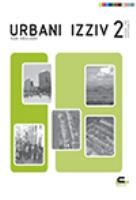Cities as the keys to survival? The impact of the economic crisis on health inequalities in Hungary in terms of unemployment and life expectancy
Cities as the keys to survival? The impact of the economic crisis on health inequalities in Hungary in terms of unemployment and life expectancy
Author(s): Tamás Egedy, Annamária UzzoliSubject(s): Rural and urban sociology, Welfare services, Public Finances, Socio-Economic Research
Published by: Urbanistični inštitut Republike Slovenije
Keywords: health inequalities; economic crisis; unemployment; life expectancy; micro-regions and cities; Hungary
Summary/Abstract: This article interprets the spatial dimension of health inequalities in Hungary through the connection between unemployment and life expectancy from the national level to the level of micro-regions and settlements with a special emphasis on cities. The article highlights the correlation between unemployment and average life expectancy at birth based on regional statistical databases. The results of quantitative questionnaires (n = 545) and qualitative in-depth interviews (n = 26) are also presented in order to explore the effect of the crisis on urban populations residing in major Hungarian cities. The correlation between unemployment and life expectancy becomes stronger during crisis periods. Our findings indicate not only that the labour-market position and level of income are important from a health point of view, but also that the level and growth of existing social and health inequalities strengthen the effects of the crisis on health. It is evident that, in Hungary, direct effects of the crisis on health inequalities exacerbate regional differences. Cities can counterbalance the unfavourable health effects of the crisis and they may successfully contribute to decreasing health inequalities.
Journal: Urbani izziv
- Issue Year: 27/2016
- Issue No: 2
- Page Range: 97-111
- Page Count: 15
- Language: English

